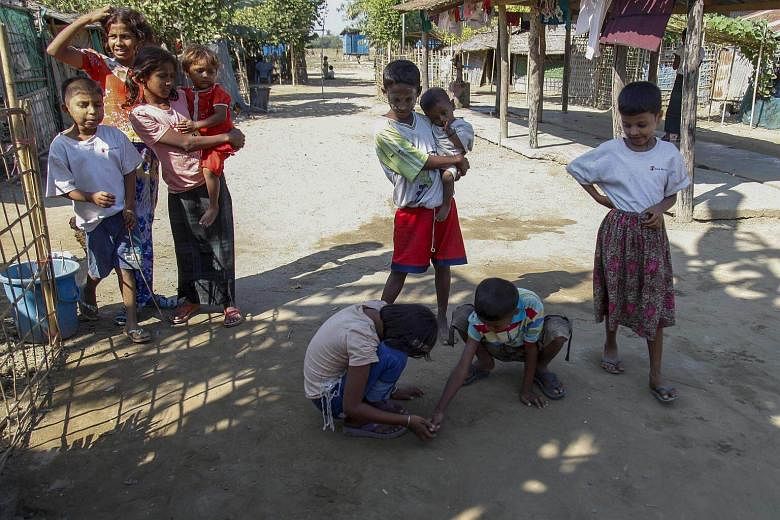Those hoping for more concrete initiatives out of Monday's meeting of Asean foreign ministers over the situation in Myanmar's Rakhine state were duly disappointed.
Malaysia, which hosts some 56,000 ethnic Rohingya displaced from Rakhine, proposed in the Yangon meeting that Asean coordinate humanitarian assistance and establish an independent fact-finding group.
But Myanmar's Foreign Minister and de facto leader Aung San Suu Kyi merely reiterated her government's "serious commitment to the resolution of the complex issue" and called for "time and space" for its efforts to bear fruit.
Labelled by some as empty talk, her response also provides an opening, say observers.
"Although it stopped short of a concrete arrangement for Asean to contribute as a group, the door is not closed," Iseas - Yusof Ishak Institute fellow Hoang Thi Ha tells The Straits Times. "Asean should push it open wider."
-
Much of the international pressure so far has been borne by Ms Suu Kyi, who while helming a democratically elected government, essentially shares power with a military that is guaranteed a quarter of all parliamentary seats as well as control of the country's defence, home affairs and border affairs.
Since Oct 9, when a group of alleged Muslim militants attacked border guard police in Rakhine state, there has been a steady stream of reports from fleeing Rohinyga about retaliatory attacks from the military: rapes, killings and burning of villages.
The Myanmar authorities have denied these allegations even as they limited access to parts of northern Rakhine state where the alleged atrocities are said to have taken place.
Even before this flare-up, the Rohingya issue was already on the regional map. Muslim Rohingya, who number about one million in Buddhist-majority Myanmar, are seen by the state as "Bengali" migrants and effectively stateless.
Those displaced by communal violence in 2012 have been living in increasingly desperate conditions in squalid camps, making them risk perilous journeys on crammed boats to reach Malaysia or beyond. A Thai crackdown on human trafficking last year left these migrants stranded on boats in South-east Asian waters.
The events on Oct 9 gave the Rakhine situation an ominous spin. A report released by the International Crisis Group last week linked them to a group called Harakah Al-Yaqin, led by Rohingya emigres in Saudi Arabia and "commanded on the ground by Rohingya with international training and experience in modern guerrilla war tactics".
"The current use of disproportionate military force in response to the attacks, which fails to adequately distinguish militants from civilians, together with denial of humanitarian assistance... and the lack of an overarching political strategy that would offer them some hope for the future, are unlikely to dislodge the group and risk generating a spiral of violence and potential mass displacement," it said.
These could "create conditions for further radicalising sections of the Rohingya population that transnational jihadists could exploit".
Much of the international pressure so far has been borne by Ms Suu Kyi, who, while helming a democratically elected government, essentially shares power with a military that is guaranteed a quarter of all parliamentary seats as well as control of the country's defence, home affairs and border affairs.
Human rights advocacy group Burma Campaign UK has noted that the international community was not tailoring its interventions to recognise that Myanmar's military "is responsible for the majority" of the problems in the country.
But Asean Parliamentarians for Human Rights chairman Charles Santiago tells The Straits Times Ms Suu Kyi should at least "stop justifying what the military is doing and allow an international body to investigate".
Iseas - Yusof Ishak Institute's Ms Hoang adds that Asean should leverage on "its power of non-confrontational persuasion" to help craft a solution.
It is "untenable" to localise the issue within Myanmar's boundaries, she said. "Its spillover effects - exodus of migrants and stimulation of jihadism - have gone beyond Rakhine state to impact the Asean region."

